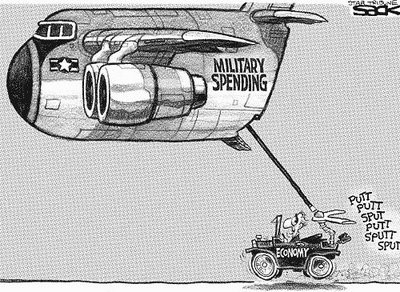By Dan Froomkin
WASHINGTON -- The United States is now spending nearly half a billion dollars a year in an attempt to establish the "rule of law" in Afghanistan. But a new government report suggests it may just be that much more money down the drain.

The central problem, according to the report from the nonpartisan Congressional Research Service (CRS), is that corruption in Afghanistan is so widespread and entrenched that it severely undermines any effort to establish confidence in government institutions.
The report, which suggests that the 112th Congress might be interested in examining the effectiveness of rule of law support going forward, was obtained and web-published by Steven Aftergood of Secrecy News.
Rule of law, as Aftergood explains, simply means a stable, predictable, and fair application of public legal standards. But it's a linchpin in the Obama administration's plan to put an Afghan government on its feet that can run the country on its own.
The State Department's official stabilization strategy lists rule of law as a key focus. It explains:
The limited, unresponsive, and unreliable nature of the Afghan justice system is a central source of Afghans' grievances with their government and has opened the door to Taliban "shadow governance." As long as the population views the government as weak or predatory, Taliban approaches to security and justice will continue to be accepted. We are committed to helping the Afghan government reverse this trend.
But, as the CRS report notes, the scale of corruption in Afghanistan is almost inconceivable.
Transparency International's annual corruption index last month ranked Afghanistan the second most corrupt country in the world, behind Somalia.
A recent Pentagon survey found that 83 percent of Afghans said that government corruption affected their daily lives.
And according to the United Nations Office on Drugs and Crime (UNODC), as many as one out of every two Afghans experienced bribery in the past year, resulting in an estimated $2.5 billion in bribe payments in 2009 alone -- an amount that almost rivals the estimated value of the Afghan drug trade.
As it happens, $2.5 billion is also almost one fourth of the nation's entire gross domestic product.
The report notes that official corruption "is particularly prevalent in the law enforcement and judicial sectors." But it goes all the way to the top of the food chain, as well:
At the upper levels of government, several press accounts and observers have asserted that Afghan President Hamid Karzai deliberately tolerates officials who are allegedly involved in the narcotics trade and other illicit activity. Press accounts further assert that President Karzai supports such officials' receipt of lucrative contracts from donor countries, in exchange for their political support.
The U.S. government's spending to establish rule of law has dramatically accelerated under the Obama administration, from an estimated $7 million in fiscal year 2002 to an estimated $411 million in fiscal year 2010. In July, the State Department established a separate ambassador-rank position in the Kabul Embassy specifically for rule of law issues.
But there's no precedent for anything like sustained success. A Defense Department report from earlier this year, for instance, warned that there has been "little enduring progress despite significant investment toward reform, infrastructure and training" in the justice sector. And, it said, while Afghanistan has "achieved some progress on anti-corruption, in particular with regard to legal and institutional reforms, real change remains elusive and political will, in particular, remains doubtful."
The CRS report concludes:
Afghan officials have also raised similar concerns, arguing that despite increasing resources devoted to justice sector support, efforts have not yet translated into a functional formal justice system in Afghanistan. The 112th Congress may choose to address these long term issues in the context of the Obama Administration's review of U.S. strategy to Afghanistan, expected to take place in mid-2011. Other potential decision points for Congress may center on FY2011 appropriations and congressional review of the Administration's FY2012 budget request.
Dan Froomkin is senior Washington correspondent for the Huffington Post.



